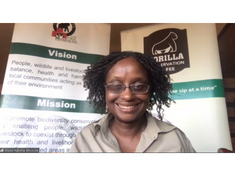-
Happy World Gorilla Day! A Conversation with Dr. Gladys Kalema-Zikusoka on COVID-19’s Impact on Gorilla Conservation and Public Health in Uganda
September 24, 2021 By Shruti Samala “When we started out, people thought it was weird. ‘Why are you integrating people and animals and why are you integrating human health and animal health?’” says Kalema-Zikusoka, founder of Conservation Through Public Health (CTPH), in this week’s New Security Broadcast. Indeed, health infrastructure and conservation have long been organized around distinct silos. “Donors were focusing on single sector funding, and government departments were aligned along single sectors,” says Kalema-Zikusoka.
“When we started out, people thought it was weird. ‘Why are you integrating people and animals and why are you integrating human health and animal health?’” says Kalema-Zikusoka, founder of Conservation Through Public Health (CTPH), in this week’s New Security Broadcast. Indeed, health infrastructure and conservation have long been organized around distinct silos. “Donors were focusing on single sector funding, and government departments were aligned along single sectors,” says Kalema-Zikusoka.“When we started out, people thought it was weird. ‘Why are you integrating people and animals and why are you integrating human health and animal health?’” says Kalema-Zikusoka, founder of Conservation Through Public Health (CTPH), in this week’s New Security Broadcast. Indeed, health infrastructure and conservation have long been organized around distinct silos. “Donors were focusing on single sector funding, and government departments were aligned along single sectors,” says Kalema-Zikusoka.
To protect Uganda’s mountain gorillas, however, Kalema-Zikusoka recognized the need to set up an organization that could prevent disease transmission between humans and wildlife. Improving the health and well-being of communities in and around protected areas would help to ensure that they were less likely to have infectious diseases, could enjoy a better quality of life, and would ultimately enable communities to co-exist better with the wildlife.
Over the past decade, there has been growing awareness and acceptance of this approach to conservation and public health. Often referred to as “One Health,” it is a multisectoral approach to disease prevention that centers interconnections between wildlife, ecosystem, and human health. Evidence tracing COVID-19’s origins to virus transmission between bats, an intermediate host, and humans only heightened the awareness of the interdependency between wildlife and human health.
CTPH’s approach to community health has made them an asset for addressing COVID-19. The Ugandan Ministry of Health requested that the NGOs working with community health workers create village COVID task force committees, says Kilema-Zikusoka. They were worried that mounting infections could easily become more severe, and there were not enough beds and oxygen, particularly in protected areas, which lack even more resources than the cities. These action groups—now in 59 villages—are led by the village head and conservation team, and include the Uganda Wildlife Authority, porters at gorilla reserves, women and religious groups, and educational staff members. Such holistic, coordinated One Health efforts are essential for disaster preparedness and response in communities where wildlife and humans share a habitat, says Kalema-Zikusok.
Despite this progress, tensions between human and animal health continue to emerge. Last year, hunger and economic desperation caused by the loss of tourism revenue drove a poacher to enter a protected area and kill a member of Uganda’s silverback mountain gorilla population. To prevent further endangerment, CTPH has implemented a range of short and long term measures to tackle pandemic-induced food insecurity—distributing fast growing green seedlings in the community; encouraging sustainable farming as an alternative to poaching; and ensuring gorilla guardians and reform poachers are trained in and benefitting from COVID-19 prevention initiatives.
“This is an area we got into because of the pandemic. We started to look at food security more closely as an organization, so we have also grown just like other organizations during this very difficult time,” says Kalema-Zikusoka. There are important lessons learned and insights drawn from the pandemic that we must carry forward in order to realize a safer future for humans and animals alike.
Read More:
- In Uganda, Integrating Population, and Environment to Meet Development Goals
- Advancing One Health: Protecting People, Gorillas, and the Land on Which They Live
New Security Broadcast is also available for download on iTunes and Google Podcasts.
 A Publication of the Stimson Center.
A Publication of the Stimson Center.

 “When we started out, people thought it was weird. ‘Why are you integrating people and animals and why are you integrating human health and animal health?’” says Kalema-Zikusoka, founder of
“When we started out, people thought it was weird. ‘Why are you integrating people and animals and why are you integrating human health and animal health?’” says Kalema-Zikusoka, founder of 

